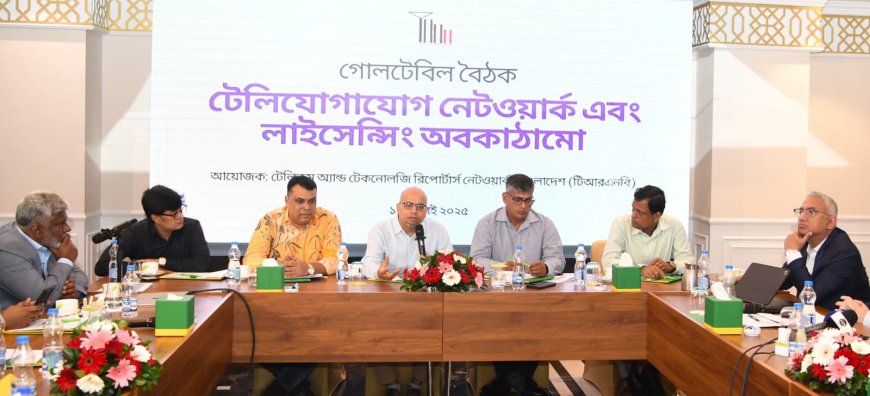Telecom Transformation Touted in New Policy Push

To free Bangladesh’s telecom sector from 15 years of “fascism,” the interim government is introducing a sweeping reform of telecom policy. Faiz Ahmad Taiyeb, Special Assistant to the Chief Adviser on Posts, Telecommunications and ICT, has effectively annulled the previous ILDTS policy of the BTRC, citing the need to end operator-centric loopholes and regulatory imbalance.
Speaking at a roundtable discussion on “Telecom Network and Licensing Policy Reform” hosted by the Telecom and Technology Reporters Network Bangladesh (TRNB) on Saturday, July 12 at Hotel Holiday Inn in Dhaka, Faiz Ahmad Taiyeb emphasized, “The new policy is being developed to move from mere connectivity to generation service transformation in order to address the evolving needs of this generation. The aim is to resolve life’s problems through services.”
He stated that the new approach is necessarily “prescriptive” due to the clutter and legacy issues plaguing the sector. “We are going to optimize services, reform management, and replace the existing ecosystem. In doing so, some entrenched interests may be hurt, but our priority is national welfare,” he added. While he acknowledged that further consultation would have been ideal, he clarified, “We are constrained by time. Still, constructive suggestions will be taken into account before the policy is finalized.”
He strongly criticized operators for resisting reform despite generating significant profits. “Operators have made profits worth Tk 40 billion but remain dissatisfied. It is time they think of the country’s interests. This policy abolishes the previous ‘toll collector’ model and instead introduces a service-based, tech-driven, and competitive framework.”
Taiyeb claimed that the past policy was misused, stating, “The ILDTS policy was exploited at every level, with the same players allowed to operate across all layers. Politically motivated individuals were handed licenses in exchange for money and influence, leading to 3,000 licenses under a single regime — an unprecedented case of regulatory abuse.”
He urged license holders to prioritize mutual understanding and collaboration, noting, “No matter how good the policy is, it won’t be effective without stakeholder consensus.”
BTRC Chairman Major General (Retd.) Md. Emdadul Bari also addressed the session, stating, “Telecom policy is a government prerogative. This policy shift is necessary to move away from a chaotic state. Since telecom is a real-time service, abrupt changes could cause disruptions. Hence, stakeholders will be consulted while formulating implementation guidelines.”
Bari further noted that “businesses have used muscle power in the past,” resulting in 90 million people and 2.5 million households still being unconnected. He emphasized enhancing service usage and promised that no current license holder would be arbitrarily excluded under the new framework. “There will be migration opportunities, and we will regulate the market through KPIs rather than issuing more licenses.”
Posts and Telecommunications Division Secretary Md. Zahurul Islam remarked that the proposed reforms would safeguard the sector for at least 15 years and attract both local and foreign investments.
MTAB Secretary General Mohammad Zulfikar, presenting the keynote, expressed concerns over the complexity of the proposed policy, stating that its core objectives — fostering innovation and investment — might be difficult to achieve under current terms. Operators fear that new clauses may hinder both current and future investments in the telecom sector.
Banglalink CEO Erik Aas stated, “A true digital economy depends on seamless connectivity and affordable internet — elements that drive innovation and leave no one behind. We have invested $2.5 billion in Bangladesh, with $300 million spent recently on 4G expansion and modernization.”
He added, “We work for those still disconnected from the internet — especially the youth who deserve access to opportunities online, and the SMEs that require digital tools to compete globally. Their empowerment will strengthen the nation, and this vision drives me every morning.”
Grameenphone CEO Yasir Azman highlighted practical limitations faced by operators. “There is confusion in the new policy. We are not entirely foreign-owned; we have local shareholders through the stock exchange. We’re facing closures of 700 towers, and we cannot install new ones. Even though we have fiber, we won’t be allowed to maintain it. Investors hesitate due to operational uncertainties.”
Robi’s Chief Corporate Affairs Officer Barrister Shahed Alam warned, “If existing foreign operators are forced to reduce their shareholding to 85 percent, shareholder value will be undermined. A better approach would be to open the market to new entrants under the new licensing framework.”
In response, Taiyeb confirmed that the finalized policy, shaped by ongoing feedback, would soon be presented to the Advisory Council. “Through this reform, we aim to elevate the telecom ecosystem and open new avenues for business,” he concluded.
Other participants in the discussion included GP Chief Corporate Affairs Officer Tanvir Mohammad, Banglalink Chief Corporate Affairs Officer Taimur Rahman, Axiata AVP Mohammad Didarul Alam, Teletalk MD Nurul Mabud, Fiber@Home CIO Sumon Ahmed Sabir, FICCI Executive Director TIM Nurul Kabir, World Bank Consultant Mahtab Uddin Ahmed, and ISPAB President Aminul Haque.









































































































































































































